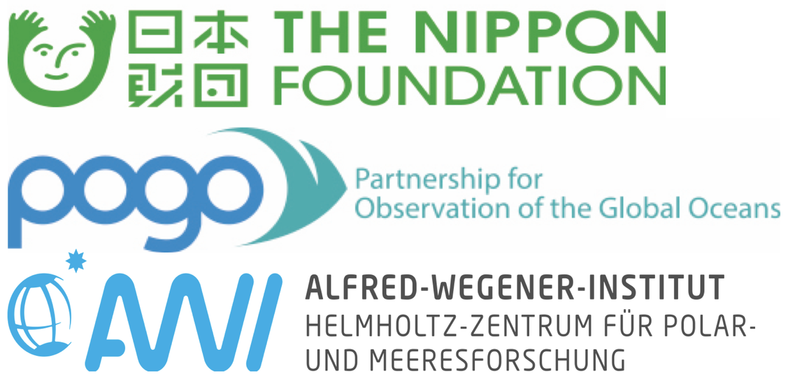affiliatePogo
POGO Centre of Excellence
Courses tagged with "affiliate::pogo"

NFPOGO-TSEC2021_Unit16
NF-POGO Centre of Excellence. Timescales of Element Cycling in the Ocean- Analytical, Experimental and (radio)Tracer Approaches
Unit on Timescales of Element Cycling in the Ocean-Analytical, Experimental and (radio) Tracer Approaches

NFPOGO-CP2021_MSP_Unit12
NF-POGO Centre of Excellence. Marine Spatial Planning Module
Unit on Marine Spatial Planning

NFPOGO-CP2021_PO I_Unit8
NF-POGO Centre of Excellence. Physical Oceanography I
Unit on Physical Oceanography I

NF-POGO Centre of Excellence. Physics of the Climate System I (Basics)
The Physics of the
Climate System “Warming of the climate system is unequivocal, and since the 1950s, many
of the observed changes are unprecedented over decades to millennia. The
atmosphere and ocean have warmed, the amounts of snow and ice have diminished,
sea level has risen, and the concentrations of greenhouse gases have
increased.” This statement in the Fifth Assessment
Report of the Intergovernmental Panel on Climate Change (IPCC) in 2013 is based
on a wide variety of climate observations and model simulations. The
present characteristics of the climate system are a product of a long-term
evolution determined by external forcing (sun, volcanoes) and internal
interactions within the climate system, which is composed of atmosphere, ocean,
cryosphere, land surfaces, and the marine and terrestrial biosphere. Until 250
years ago, the interference of man was small, and climate variations were a
product of natural processes and interactions alone. Since the beginning of industrialisation
the composition of the atmosphere, especially the concentrations of greenhouse
gases, such as carbon dioxide and methane, have significantly increased. In
addition, the character of the land surface has been largely modified through
land-use and land-cover change through human activities. Most of the observed
global warming during the past 100 years is attributed to these anthropogenic
impacts. This course provides the evidence of climate
variations on all time-scales and their response to human impacts, and presents
an introduction to the physics of the climate system, with a special focus on
atmosphere, ocean and ice. Exercises in the afternoons will deal with specific
climate processes and with the energy balance of the Earth and other planets. Special topics are: ·
evidence
for climate variations on a variety of time-scales from in-situ measurements,
remote sensing techniques, climate archives, and palaeo-climate proxies, ·
physical
properties of the climate system and its components (atmosphere, ocean, ice), ·
physical
processes relevant for climate variability and change, ·
simple
models of the climate system (energy balance models, Daisy World), ·
climate
scenarios from complex coupled climate models, ·
new
results from the latest IPCC reports.

NFPOGO-INTRO2021_Unit0
NF-POGO Centre of Excellence. Introductory module
To get familiar with each other and with the technical issues of the teaching tools. Get to know administrative issues, learn how to apply the folderscope and the VPN server, introduction to netiquette and good scientific practice. Get to know the hosting institutes, the Nippon Foundation and the POGO consortium

NFPOGO-CP2021_Phyto_ChemOce_Unit1
NF-POGO Centre of Excellence. Phytoplankton and Chemical Oceanography
Unit on chemical oceanography, nutrients and plankton.

NFPOGO-ODM2021_Unit5
NF-POGO Centre of Excellence. Ocean Data Management module
This 2 week-long module on Ocean Data Management is part of the Nippon Foundation-POGO Centre of Excellence (NF-POGO CofE) and hosted by AWI (cohort 2021). This module is part of an intensive training course for young professionals at the post-graduate level, ten months in duration, with an intake of ten trainees per year. The course is sponsored by the Nippon Foundation and hosted by the Alfred Wegener Institute for Polar and Marine Research.
This module provides a comprehensive introduction to a wide variety of earth science datasets, formats and analysis software. Students will learn and practice methods using a common ocean area, and they are expected to create a personal project of data products for a marine region of their own choosing. Personal projects are presented by the students at the end of the course.
Course/Module Dates: 15-26 February 2021

NFPOGO-ODM2022
NF-POGO Centre of Excellence. Ocean Data Management module
This 2 week-long module on Ocean Data Management is part of the Nippon Foundation-POGO Centre of Excellence (NF-POGO CofE) and hosted by AWI (cohort 2022). This module is part of an intensive training course for young professionals at the post-graduate level, ten months in duration, with an intake of ten trainees per year. The course is sponsored by the Nippon Foundation and hosted by the Alfred Wegener Institute for Polar and Marine Research.
This module provides a comprehensive introduction to a wide variety of earth science datasets, formats and analysis software. Students will learn and practice methods using a common ocean area, and they are expected to create a personal project of data products for a marine region of their own choosing. Personal projects are presented by the students at the end of the course.
Course/Module Dates: 28 March-8 April 2022

NFPOGO-ODM2023
NF-POGO Centre of Excellence. Ocean Data Management 2023
This 2 week-long module on Ocean Data Management is part of the Nippon Foundation-POGO Centre of Excellence (NF-POGO CofE) and hosted by AWI (cohort 2023). This module is part of an intensive training course for young professionals at the post-graduate level, ten months in duration, with an intake of ten trainees per year. The course is sponsored by the Nippon Foundation and hosted by the Alfred Wegener Institute for Polar and Marine Research.
This module provides a comprehensive introduction to a wide variety of earth science datasets, formats and analysis software. Students will learn and practice methods using a common ocean area, and they are expected to create a personal project of data products for a marine region of their own choosing. Personal projects are presented by the students at the end of the course.
Course/Module Dates: 5-16 June 2023









